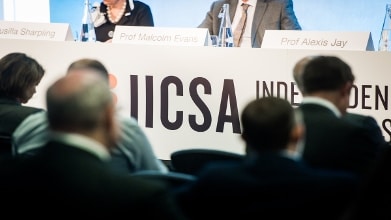
What are the key takeaways of the IICSA’s report ‘Child sexual abuse in sports’?
IICSA has just produced its fourth Truth Project Thematic report, ‘Child sexual abuse in sports’. Patrick Sadd summarises the key takeaways of the report.
The Report
As with the first three reports – child sexual abuse in religious institutions (May 2019), in children’s homes and residential care (November 2019) and custodial institutions (April 2020) – this is drawn from the experience of victims and survivors between the 1950s and 2010s, here in the context of organised sports : sports clubs, institutions or associations or organised local sporting activity.
The sample is small – of the 3,939 people giving their account between June 2016- March 2020, 2% described sexual abuse in a sports context, of which 91% were abused by sports coach or volunteer. Sports clubs were the most frequent location. The report does not address sexual abuse in high-performing or elite settings. It has a section on child protection in sport and notes that since 2001 there has been a joint NSPCC and Sports England ‘Child Protection in Sport’ Unit and reports from the Scottish and English FAs are awaited (delayed by criminal trials taking place).
Here are some takeaways:
- there was a near 50/50 split between female and male victims, more of whom were under 11 (37) than 12 or over (27)
- there was little evidence of perpetrators’ exploiting their victims’ future sporting career prospects or success as a method of grooming;
- perpetrators would gain the favour of parents and offer to look after or take out children who they coached, unsupervised – it was easy to organise coaching with a child
- generally, there was a lack of supervision of adults working in sports – especially with private coaches and ‘head’ coaches – ‘sport can provide unsupervised access to children’
- sports coaching normalises physical contact between coach and child
- the amount of time spent between coach and child creates ‘exclusivity’
- sports clubs foster silence, shame and embarrassment: disclosure being a ‘weakness’ in a sporting context
- where there was a ‘community’ of families with children coached and parents/coaches, disclosure was more difficult, and abuse of siblings made easier
- generally disclosure was very difficult: parents were not alert to changes in behaviour: and children who did disclose were subject to victim-blaming responses by adults.
Comment:
- the frequent experience of those abused in sports’ academies or elite youth training (football a prime example) is of the perpetrator exploiting the victim’s keenness to succeed, their desire to be picked for the squad, their fear of being left out if the perpetrator is thwarted
- there is nothing new in the nigh-on universal experience of how difficult it is to disclose and how successful a perpetrator can be once he or she has befriended parents or gained their admiration (eg the sporting prowess of a coach)
- A sporting environment creates an added barrier for a child or young person: confronting the widely held admiration for a coach amongst parents and children
- Chelsea FC’s report into Eddie Heath and the case of DSN v Blackpool Football Club reflect how easy an abuser was able to abuse in plain sight; more recently as the IICSA accounts show abusing in plain sight in a sporting environment requires constant review of safeguarding practice.
About the Author
Patrick Sadd is a leading junior in UK Inquests & Public Inquiries Law and is regularly instructed as counsel to major public inquiries and investigations. Over the last five years Patrick has been lead into two inquiries, as counsel to the Independent Jersey Care Inquiry (2013-2017) looking at abuse of children in care in the island and an as lead counsel in the Nottingham Councils Investigation, a part of the national Independent Inquiry into Child Sexual Abuse chaired by Professor Alexis Jay.
Find Out More
If you would like to discuss any of the issues covered in this article please contact Patrick directly or via his practice management team; Graham Woods and Chris Rowe (+44 (0)20 7353 6381) who would be happy to have a discussion in the strictest of confidence.
Legal Blogs 22 Jun, 2020
